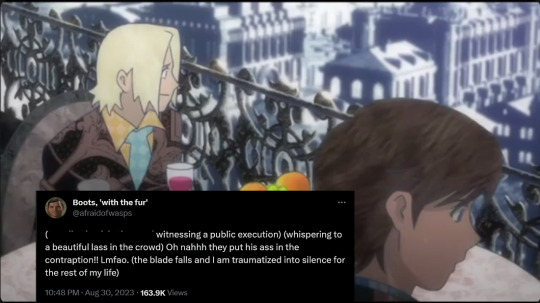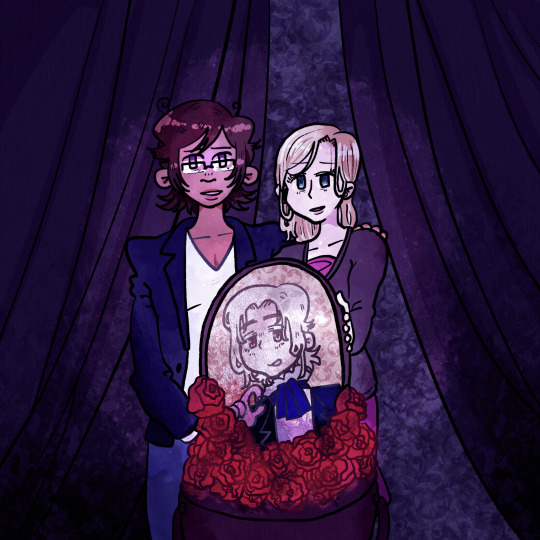#franz d’epinay
Text

funny to me at least
41 notes
·
View notes
Text

#gankutsuou#gankutsuou: the count of monte cristo#don’t follow my Twitter lol I’m dumb#albert de morcerf#franz d’epinay#fanart
63 notes
·
View notes
Text
sometimes when i consume a new piece of media i’m like well i think i should dress up as [obscure character nobody in real life will ever recognize] next halloween
8 notes
·
View notes
Text
franz d’epinay: “Sir, do you know who killed my father? Can you tell me who he is?”
m. noirtier:

20 notes
·
View notes
Text
The Calendar of Monte Cristo: Chapter 31
c.1834: Franz d’Epinay begins his residence in Italy. [R]
Early 1838: Franz visits the island of Monte Cristo and meets Sinbad the Sailor. [E]
February 1838: Carnival in Rome. [H]
4 notes
·
View notes
Text
shoutout to all the normal people in the count of monte cristo who are just caught up in the count’s schemes. shoutout franz d’epinay
46 notes
·
View notes
Text
it won’t let me edit the post but other iconic classic lit gays are albert de morcef and franz d’epinay
3 notes
·
View notes
Text
For all that unrequited lovers can pluck plaintively at an audience’s heartstrings, yours truly’s included, it’s more often than not (unless you are Tomoyo Daidouji or Franz D’Epinay) a selfish position. Unrequited love is about the love object in that they represent a lack in our POV character – something they cannot, whether by internal or external circumstances, achieve. Often the character pines and grumbles about how the love object won’t notice them, romanticizing themselves in a mini-tragedy. And to have that love returned is not a union of two people but a reward to validate the self. [...]
In the context of Utena, Jury’s story has a unique place. Because of the many permutations of attraction in the series, queer and hetero, her burden becomes not ‘THE TRAGEDY OF GAY’ but about her inability to break from her obsessiveness, and that same selfishness I discussed before. Jury’s story is marked out because it is about an individual’s desire to use someone to fill a hole in their life (notice the very forceful word choice of ‘make you realize’), to varying levels of consciousness (and Shiori is doing the very same thing in a different way, which we’ll get to later). It’s not about that person but what they represent, while Utena’s relationship with Anthy is ultimately triumphant because it becomes a relationship of equals. (x)
totally normal about this, don't worry
2 notes
·
View notes
Note
franz d’epinay ça rime avec gay
It does
5 notes
·
View notes
Text
i..i forgot..that hirarin voiced franz d’epinay in gankutsuou..
#god I need time to do my yrly reread the count of monte cristo#and rewatch the anime#used to have a count of monte cristo phase here#I really should write an introduction or a card for this blog#but I want the things I talk about to be a surprise#like one day I’m just gonna talk about an 1972 movie out of the blue
1 note
·
View note
Text
Just once I want an adaptation of tCoMC to include the scene where Edmund meets Franz, not in Rome as Albert’s sensible friend, but on Monte Cristo, as the idiot who thought a smuggler’s den made for a fine adventure. Because Eddy taking one look at Franz and immediately going ‘you are my kind of man, I’m gonna tell you about my revenge and retirement plans and give you all the clues to my identity even though we’ve never met before; wanna get high?’ is hilarious and needs to be adapted.
76 notes
·
View notes
Text


skeletons buried in the closet / last embrace
10 notes
·
View notes
Text
I also would hallucinate beautiful statues of women coming to life and kissing me with terrible passion. Me and Franz are the same
9 notes
·
View notes
Text
TCOMC Characters but as Billy Joel Songs Part 2
Albert de Morcerf:
“After all, this is my big night on the town, my introduction to the theater crowd. I assumed that the show would have a song, so I was wrong.”
Franz d’Epinay:
“All I want is someone to believe.”
Maximilien Morrel:
“She's got a light around her and everywhere she goes a million dreams of love surround her everywhere.”
Valentine de Villefort:
Eugénie Danglars:
“I don't care what you say anymore, this is my life. Go ahead with your own life, leave me alone.”
Beauchamp, Debray, and Château-Renaud, snapping in unison:
“Whoa-oh-oh-oh.”
#the count of monte cristo#alexandre dumas#tcomc#billy joel#albert de morcerf#franz d’epinay#maximilien morrel#valentine de villefort#eugénie danglars#Spotify
14 notes
·
View notes
Text
Franz: I want to hear those three little words.
Albert: I love you!
Franz: That’s sweet but try again.
Albert: Fine...I will behave.
35 notes
·
View notes
Text
Some differences from what the older translation says is the beginning of chapter 40 and the newer translation says is the end of chapter 39.
First, Beauchamp’s response to Debray saying that he ought to consider himself as being of the same political party as Danglars:
—Voilà, pardieu, bien le mal! aussi j’attends que vous l’envoyiez discourir au Luxembourg pour en rire tout à mon aise.
“Pardieu, that is exactly the worst of all. I am waiting until you send him to speak at the Luxembourg, to laugh at my ease.”
“Damnation, that’s the worst thing about it! That’s why I’m waiting for you to boot him into the Upper House, where I can laugh at him as much as I like.”
Then, Château-Renaud’s explanation of why he went to Africa:
—Et vous avez raison, Beauchamp, dit le jeune aristocrate; c’était tout bonnement pour faire le coup de pistolet en amateur. Le duel me répugne, comme vous savez, depuis que deux témoins, que j’avais choisis pour accommoder une affaire, m’ont forcé de casser le bras à un de mes meilleurs amis... eh pardieu! à ce pauvre Franz d’Épinay, que vous connaissez tous.
—Ah oui! c’est vrai, dit Debray, vous vous êtes battu dans le temps... À quel propos?
—Le diable m’emporte si je m’en souviens! dit Château-Renaud; mais ce que je me rappelle parfaitement, c’est qu’ayant honte de laisser dormir un talent comme le mien, j’ai voulu essayer sur les Arabes des pistolets neufs dont on venait de me faire cadeau.
“You are quite right, Beauchamp,” observed the young aristocrat. “It was only to fight as an amateur. I cannot bear duelling since two seconds, whom I had chosen to arrange an affair, forced me to break the arm of one of my best friends, one whom you all know—poor Franz d’Epinay.”
“Ah, true,” said Debray, “you did fight some time ago; about what?”
“The devil take me, if I remember,” returned Chateau–Renaud. “But I recollect perfectly one thing, that, being unwilling to let such talents as mine sleep, I wished to try upon the Arabs the new pistols that had been given to me.
“You are quite right, Beauchamp,” said the young aristocrat. “It was quite simply to get some amateur pistol-shooting. As you know, I hate duels, since the time when two witnesses, whom I had chosen to settle some dispute, obliged me to break an arm of one of my best friends. Yes, by heaven! It was poor Franz d’Epinay, whom you all know.”
“Of course! That’s right,” said Debray. “You did have a duel once. What was it about?”
“The devil only knows: I can’t remember!” said Château-Renard. “What I clearly recall is that I felt ashamed at letting a talent like mine go to waste, and, as I had been given some new pistols, I thought I’d try them out on the Arabs.
And finally, from what both translations agree is chapter 40, a progress report on Albert’s engagement:
...Vous m’avez en effet, monsieur, dit à Rome quelques mots d’un mariage ébauché; dois-je vous féliciter sur votre prochain bonheur?
—La chose est toujours à l’état de projet, monsieur le comte.
—Et qui dit projet, reprit Debray, veut dire éventualité.
—Non pas! dit Morcerf; mon père y tient...
...I recollect that at Rome you said something of a projected marriage. May I congratulate you?”
“The affair is still in projection.”
“And he who says in ‘projection,’ means already decided,” said Debray.
“No,” replied Morcerf, “my father is most anxious about it...
...And indeed, Monsieur, I believe you said something to me in Rome about a projected marriage. Should I congratulate you on your future happiness?”
“The matter is under consideration, Monsieur le Comte.”
“Which means ‘perhaps’,” said Debray.
“Not at all,” Morcerf replied. “My father is anxious for it to take place...
#the cristo account#the count of monte cristo#chapter 40#or chapter 39 depending on the edition#lost in translation
14 notes
·
View notes